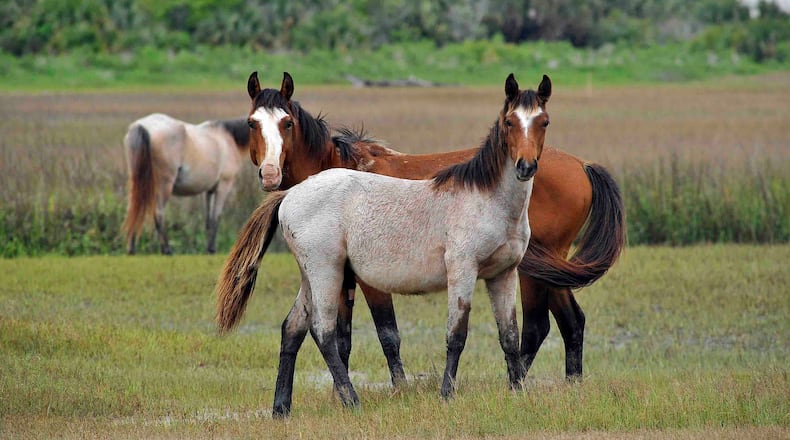A federal judge has ruled against the wild horses of Cumberland Island in a lawsuit that alleged federal and state agencies are allowing the animals to become ill, malnourished and deprived of a normal life expectancy.
U.S. District Judge Sarah Geraghty in Atlanta said lawyers representing the 125 to 175 feral horses and other plaintiffs in the case were pursuing “laudable goals: to eliminate the horses’ suffering and to protect fragile ecosystems and native species from harm.” But after “careful study,” Geraghty said she is not empowered to provide relief the plaintiffs seek under two federal and several state statutes.
“While this case must be dismissed, the court hopes that the important issues plaintiffs have raised here might spur the (National Park Service) or other agencies to act,” the judge wrote in a 53-page order signed Nov. 7.
The lawsuit sought to have Cumberland’s wild horses to be lead plaintiffs, and Geraghty allowed them to be so. She cited a 1998 opinion by the federal appeals court in Atlanta that allowed loggerhead sea turtles and green turtles to be plaintiffs in a case against Volusia County, Florida. Their lawsuit sought a ban on beachfront artificial lighting that confused the turtles’ hatchlings.
The other plaintiffs in the litigation are nonprofits The Georgia Equine Rescue League and The Georgia Horse Council as well as Will Harlan, who wrote a bestselling book about Cumberland Island, and island resident Carol Ruckdeschel, an advocate for the humane treatment of the feral horses.
“It is a very disappointing decision,” said Hal Wright, one of the plaintiffs’ attorneys. But he said he echoes Geraghty’s hope that the issues raised in lawsuit will prod federal and state agencies to address the problems.
Horses have lived on Cumberland Island for centuries, dating back to 1742, and are a major tourist draw to Georgia’s southernmost barrier island. Those on the island are now feral, meaning they are animals that once were domesticated but are now wild and no longer receiving human support.
Only a few dozen people live on the 36,000-acre Cumberland Island, which was designated a national seashore by Congress in 1972. It is well known for its undeveloped beaches, wide salt marshes and pristine forests of stately live oaks.
The lawsuit said Cumberland’s horses suffer from encephalitis, are exposed to a large parasite population and have a heightened risk of getting sick from drinking brackish and salt water on the island. In her order, Geraghty attached photos of emaciated horses submitted by the plaintiffs’ attorneys.
The suit also accused state and federal agencies of negligence for not preventing the horses from trampling on the nests of two endangered species — loggerhead sea turtles and piping plovers. The horses also are eating up the sea oats and marsh grasses that are critical to Cumberland’s ecosystem, the plaintiffs said.
The suit asked Geraghty to order a gradual removal of Cumberland’s feral horses. It also asked her to require the National Park Service and state Department of Agriculture to assess the horses’ well-being and provide them veterinary care and enough food and water to live healthy lives.
While Geraghty said none of the statutes cited by the plaintiffs allowed her to give them the relief they were seeking, she appeared sympathetic to their cause.
“No one wishes to see animals suffer, and plaintiffs have plausibly argued that the (National Park Service) should take steps to protect and manage Cumberland Island’s feral horse population, not only for the well-being of the horses, but also to preserve the island’s ecosystem and its endangered species,” she wrote.
About the Author
Keep Reading
The Latest
Featured





